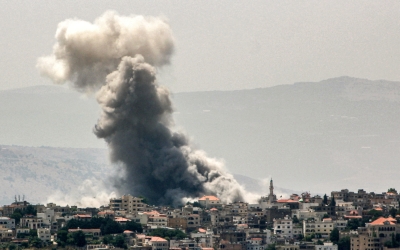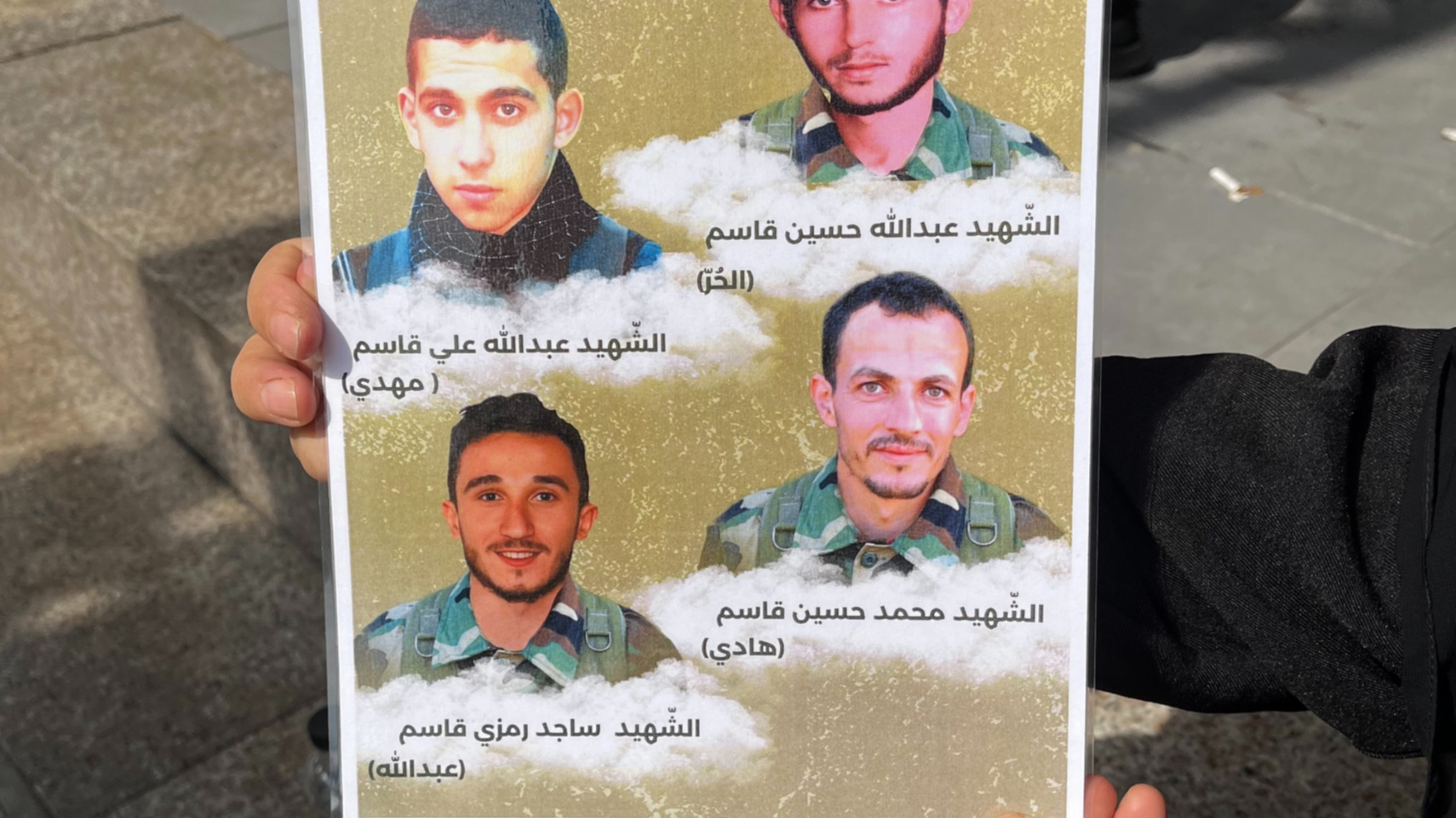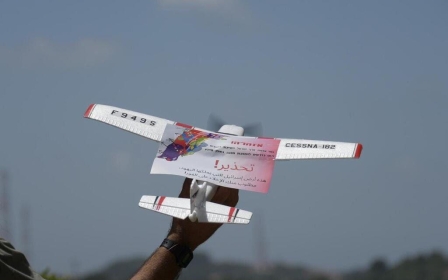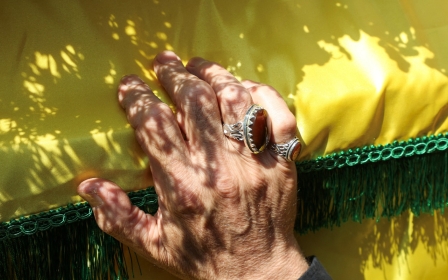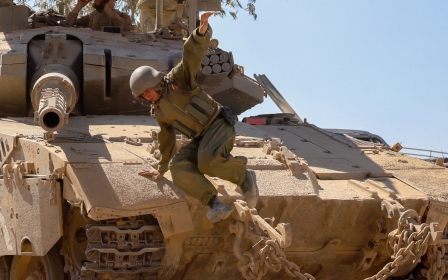Slain Hezbollah fighters take centre stage at Beirut's wartime Ashura
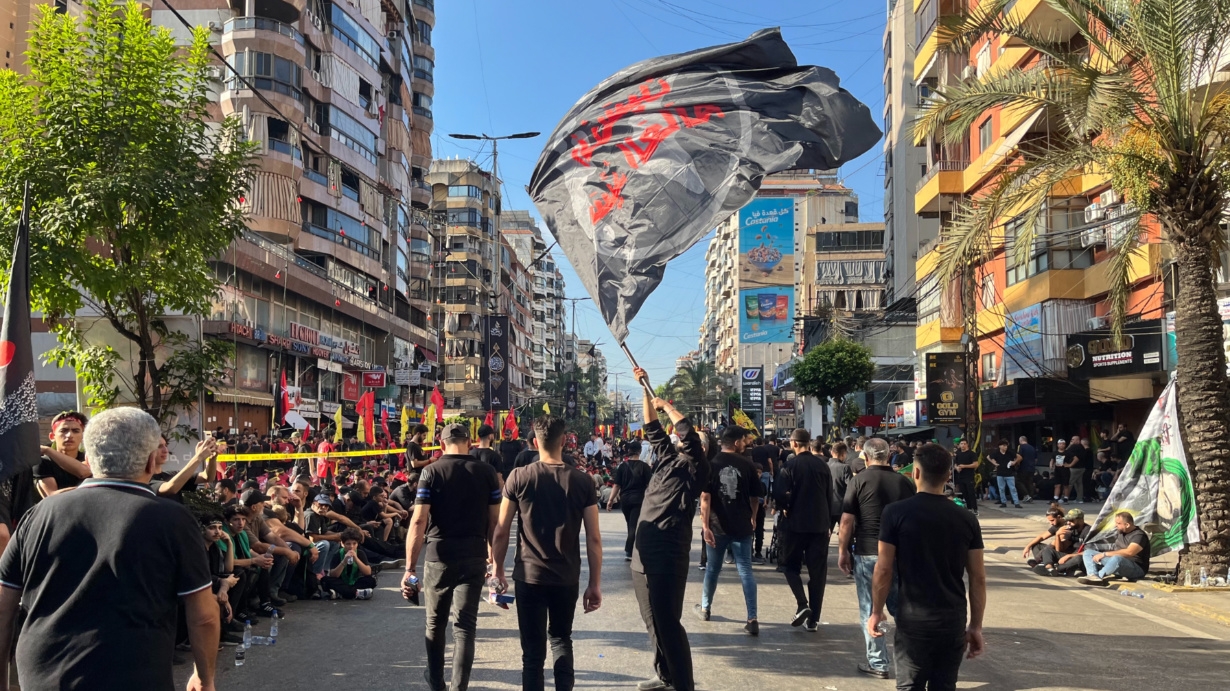
With traffic shut down in a Beirut suburb, men and women dressed in black clothing filled the streets to commemorate Ashura.
Amid the sea of red, yellow and black flags stood a Hezbollah fighter who had recently returned from the southern border.
With his young son by his side, the fighter admired the massive turnout for this year's wartime commemorations. It was a sign of "our unity" in the face of the Israeli enemy, he told Middle East Eye.
Supporters of Hezbollah from across Lebanon gathered in Beirut’s southern suburb, known as Dahiya, for the event organised by the Shia movement.
Ashura commemorates the seventh-century martyrdom of the Prophet Muhammad’s grandson, Imam Hussain, at the battle of Karbala, which played a pivotal role in the development of the Shia sect.
New MEE newsletter: Jerusalem Dispatch
Sign up to get the latest insights and analysis on Israel-Palestine, alongside Turkey Unpacked and other MEE newsletters
This year’s event specifically focused on the Israeli war on Gaza, as well as Hezbollah’s ongoing conflict with Israel, fought in solidarity with Palestinians under fire in the enclave 280km south of the Lebanese capital.
With over 320 Hezbollah fighters and dozens of civilians killed since clashes started on 8 October, according to local outlet l’Orient Today, the theme of martyrdom held even greater significance for attendees at this year's Ashura.
‘Living a new Karbala’
Hussein Mansour, a 22-year-old engineer who attends Ashura commemorations every year, linked the ongoing events in Palestine to Imam Hussain’s martyrdom over 1,300 years ago.
“We need to look at Palestine as the cause of our current era,” he told Middle East Eye.
Mansour expressed no fear of Israel’s attacks on southern Lebanon, stating he would rather “die in freedom” than “live in humiliation”.
Such sentiments were common among the Lebanese in Dahiya and echo the language often used by the Shia in southern Lebanon under Israeli fire. As another worshipper, 62-year-old Mohammed, put it: “Martyrdom is a dream to us.”
“We are living a new Karbala,” Mohammed said. “But we will come back even better than before.”
Shia worshippers mourning Imam Hussain's death marched through the broad suburban boulevard, accompanied by the sounds of speakers linking Karbala to today's battles.
Attendees were urged to send their chants “from Dahiya to the heart of Gaza” as they honoured Imam Hussain and raised their voices against the United States and Israel.
Hezbollah’s boy scouts led the march, with scores of people following and holding pictures of their relatives killed by Israel.
Among them was Zahraa Qassem, who held images of two men. The first was her brother, Mohammed, killed by Israel two weeks ago. The second was her nephew, Sajed, who was killed five months ago.
Hezbollah honoured both men as “martyrs on the road to Jerusalem”, a title they have given to every member killed in the current conflict.
“We are proud,” said Qassem.
Qassem and her family come from the southern border town of Aita al-Shaab, currently one of the most targeted villages in Lebanon.
At least a third of Aita al-Shaab’s homes have been destroyed, according to a municipal official.
Qassem and her family were displaced from their hometown and an Israeli strike hit their home.
“We will go back and rebuild our homes,” she said.
Much of Lebanon's southern border areas has been reduced to rubble, but Hezbollah Secretary-General Hassan Nasrallah vowed on Wednesday to rebuild the homes belonging to people such as Qassem.
Addressing the crowd via video link, as he has done for years to avoid assassination by Israel, Nasrallah began his speech by saluting those who have been killed in Lebanon since clashes began on 8 October. He also sent his regards to Gaza and the Palestinian armed groups fighting there.
“The essence of Ashura is that we triumph for the oppressed,” he said.
So far, Israel has targeted Lebanon using air power and artillery. However, Israeli officials have threatened to launch a ground invasion if Hezbollah persists in its attacks. Hezbollah, meanwhile, insists it will not end the conflict until Israel stops its war on Gaza, which has killed more than 38,000 Palestinians.
Nasrallah reiterated this stance on Wednesday, saying a ceasefire in Gaza would become a ceasefire in Lebanon, too. Yet, he cautioned Israel against instigating a full-scale war.
“If your tanks enter southern Lebanon, you won't suffer from a shortage of tanks because you won't have any tanks left,” he said, prompting cheers from supporters.
Israeli attacks in Lebanon in the past week have claimed civilian lives, including three Syrian children in the town of Umm al-Tut.
Nasrallah warned Israel that his movement would intensify its attacks if such attacks on civilians continued.
"Persistence in targeting civilians will push the resistance to launch missiles and target new colonies that were not previously targeted," he said, referring to Israeli towns and cities.
Middle East Eye delivers independent and unrivalled coverage and analysis of the Middle East, North Africa and beyond. To learn more about republishing this content and the associated fees, please fill out this form. More about MEE can be found here.


